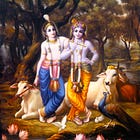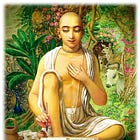Why does the Srimad Bhagavatam describe the marriage of Kardama Muni and Devahūti in such detail?
Pure devotees don't appear out of thin air; they always appear in a family where the Lord is being served.
Most of the narrations of the Srimad Bhagavatam revolve around the genealogical tree that started with Brahma and his sons. This succession started at the beginning of the current day, with the creation of the universe, and continues up to now. The genealogical tree of every human being, as well as every demigod or demon, can be traced back to these original personalities who have existed since the beginning of the universe.
We can see that although it is declared right in the first verses that the Srimad Bhagavatam deals only with pure topics connected with devotional service to the Lord and all forms of fruitive activities and materialistic religion are rejected (dharmaḥ projjhita-kaitavo ’tra), there is a lot of discussion about family life.
One may question what is the purpose of these descriptions being included in a book that speaks about pure devotional service to the Lord, and the answer is that the family life of Kardama Muni and Devahūti is not outside this scope. Their family life is a pure example of pure family life in Krsna Consciousness and is not outside the scope of devotional service. The proof is that the Lord came personally as their son to give us knowledge about devotional service in the form of the Sankhya philosophy.
Pure devotees don't appear out of thin air; they always appear in a family where the Lord is being served. The universe is composed of millions of species that generate millions of descendants every moment, but none of them are described in the pages of Srimad Bhagavatam. Instead, the book describes elevated families, where pure devotees appear. Our consciousness is largely formed by what we hear about. If we pass our time hearing about mundane love stories, we will become immersed in such lustful thoughts, and similarly, by hearing about the family life of pure devotees like Kardama Muni and Devahūti, we can gradually become absorbed in similar thoughts of devotion to the Lord.
Everything starts with Kardama Muni meditating in his ásrama. At this point, he still had some vestige of material desire. His material desire was to obtain a wife so he could fulfill the mission of his father, beget a few children, and, having this experience, progress into the renounced life without obstructions. He was a great devotee who had developed love of Godhead. His meditation was not just mechanical astanga-yoga, but a devotional trance. That's why the Lord agreed to appear to him.
There is a great difference between material blessings given by the Lord and ordinary material blessings given by demigods or things obtained through one's karma or given by materially powerful people. When the Lord gives something, He gives it in a way that one doesn't have to ask for the same thing again. In other words, He gives things in such a way that in the end one becomes purified of material desire and becomes ready to go back to Godhead. Dhruva Maharaja desired to be the king of the world, and the Lord organized for him to reign for 36,000 years, and in the end, go back home, back to Godhead. Similarly, Kardama Muni had a desire for family life, and the Lord arranged for him to have the most glorious family life and later return to his practice of austerities with a peaceful mind.
As declared in the Srimad Bhagavatam, whether one is full of desires, has no desire, or desires liberation, one should worship the Supreme Lord. If we are at all going to ask someone, we should ask the Lord, and we have the perfect example in the story of Kardama Muni.
The Lord, of course, knows everything; therefore, he was aware of the desire of Kardama Muni even before he asked. He decided to personally arrange his marriage.
Even before appearing, the Lord had already arranged the whole situation. Previously, in a visit to the court of Manu, Nārada Muni started to describe the qualities of great personalities of the universe, including Kardama Muni. Devahūti became captivated by the qualities of the sage and desired to accept him as her husband. Manu came to understand the desire of his daughter, maybe by directly talking to her, or maybe through some other relative to whom she could have revealed her mind, and considering Kardama Muni a suitable groom, went to visit him to discuss the marriage.
This system, where the father comes to offer his daughter in marriage to a suitable man she is attracted to, is considered the most auspicious type of marriage, because it assures the wife will be able to properly perform her duties, being married to the man she loves. Being properly supported, the man will be able to properly take care of the family and guide them in spiritual principles. When a man chases a woman, it is not considered so auspicious because it creates a dynamic where the man just tries to satisfy the woman materially and forgets about higher goals in life.
Both Devahūti and Kardama Muni are great souls, and they are perfectly compatible; therefore, the Lord decided to arrange their marriage. Nārada Muni describing the qualities of Kardama Muni to Devahūti was not accidental; it was all part of the divine plan. Not only was Kardama Muni blessed with the most qualified wife, but he was also blessed beget many qualified daughters to assist his father in populating the universe, as desired. More than that, the Lord promised to come personally as his son Kapila, to reveal the Sankhya philosophy and thus benefit the whole universe.
In material life, we generally have to work very hard and face a lot of anxiety to achieve anything, and whatever we achieve can be lost at any moment. However, when the Lord decides to give something, it comes without effort, and it stays with us. Neither Devahūti nor Kardama had to work hard to arrange their marriage. Devahūti desired him, and understanding the situation, Manu organized their marriage. Kardama Muni also didn't even have to leave his hermitage in search of a wife; the emperor himself came to him.
It's later described that, although a princess, Devahūti was trained in the practice of mystic yoga; therefore, she could understand and admire the qualities of the austerities performed by Kardama Muni. This is another important factor in a strong marriage. Kardama Muni was a great man, capable of performing admirable feats, and Devahūti admired these qualities. If the woman doesn't see her husband as a great man, it will be difficult for her to perform her role as a wife. The problem, of course, is that in Kali-yuga such men are rare.
Devahūti was a very qualified lady, and she was at the right age for marriage. She was also intelligent enough to choose a qualified man to be her husband, based not on just superficial attraction, but on his qualifications, hearing about him from Nārada Muni. However, it is not proper for a lady to approach a man directly; this should be done through her guardians. After understanding the desire of his daughter and desiring her well, Svāyambhuva Manu approached Kardama Muni, describing the good qualities of his daughter and offering her hand in marriage to the great sage, stating that she would be a good wife for him.
However, Manu could see that Kardama was engaged in practicing austerities. Maybe he could argue that he intended to be a Brahmacārī and not accept a wife. To counter this possible objection, Manu gave a powerful argument in an iconic verse:
"To deny an offering that has come of itself is not commendable even for one absolutely free from all attachment, much less one addicted to sensual pleasure. One who rejects an offering that comes of its own accord but later begs a boon from a miser thus loses his widespread reputation, and his pride is humbled by the neglectful behavior of others." (SB 3.22.12-13)
Manu understood that Kardama Muni was not completely free from material desire and that he had a desire to marry. Although he was practicing austerities, he had not taken a vow of perpetual celibacy, and it was thus appropriate for him to accept a qualified lady as his wife. Such an opportunity had come to him unsought. The most qualified girl was being offered in marriage to him in the most auspicious circumstances; therefore, he should accept it.
Kardama Muni, of course, remembered the words of the Lord. He was therefore ready to accept her. Devahūti was so beautiful that even inhabitants of the celestial planets would become mesmerized by seeing her, without even mentioning her other qualifications. However, the main goal of Kardama Muni was still self-realization. He desired to accept a wife to fulfill the order of his father to beget a few good children, but he didn't plan to remain in family life until his last days. He accepted Devahūti in marriage with the condition that after begetting a son, he would leave home to dedicate the rest of his life to the practice of devotional service. As he argued, this was not a whimsical decision, but the process recommended by the Lord in the scriptures. Ideally, one should be trained in spiritual practice as a Brahmacārī for the first quarter of his life, stay in family life for the second quarter, using this time to beget at least one qualified son who can take charge of the family, and then leave home to dedicate his remaining years for spiritual cultivation, instead of staying at home and gradually becoming a burden.
As Prabhupada mentions in his purports, the perfection of family life in Krsna Consciousness is to bring to our planet a ray of Vishnu, an enlightened child who can bring people to Krsna Consciousness. Kardama Muni realized this ultimate purpose by begetting Lord Kapila, and then he gave the perfect example by, after concluding his family duties, leaving home to dedicate himself to the service of the Lord.
After saying this, Kardama Muni remained silent. Because he was meditating on the Lord, he had a gentle smile on his face, which captured the mind of Devahūti. After the marriage was celebrated, Svāyambhuva Manu affectionately embraced his daughter and cried in anticipation of separation. He then returned to his capital, followed by his retinue. Kardama Muni and Devahūti thus started their uncommon family life, in which they would travel around the universe in their own flying palace, beget nine beautiful daughters who would become the mothers of most of the population of the universe, and have the Lord personally come as their son, to enlighten them in the spiritual science and bring them both back home, back to Godhead.
If you read this article to the end, give it a like or write a commentary. This makes Substack recommend it to more people.
Read also:






Hare Krishna Prabhu ji 🙏 Thank you for narrating such a captivating pastime of marriage of Kardama muni and Devahuti .